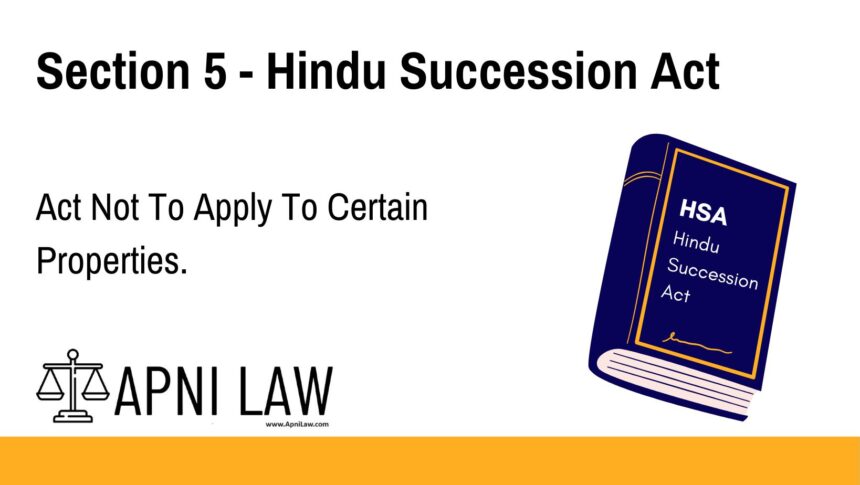Code – Section 5 of the Hindu Succession Act
This Act does not apply to:
(i) Properties whose succession is governed by the Indian Succession Act, 1925 (39 of 1925), due to section 21 of the Special Marriage Act, 1954 (43 of 1954).
(ii) Estates that descend to a single heir, as per the terms of any covenant or agreement between the Ruler of any Indian State and the Government of India or through any enactment passed before the commencement of this Act.
(iii) The Valiamma Thampuran Kovilagam Estate and the Palace Fund, governed by Proclamation (IX of 1124), dated 29th June 1949, issued by the Maharaja of Cochin.
Explanation of Section 5 – Hindu Succession Act
Section 5 clearly identifies properties that remain outside the jurisdiction of the Hindu Succession Act. Specifically, properties governed by different laws or agreements, which existed prior to the enactment of this law, are excluded from its provisions.
Here are the exceptions:
- Indian Succession Act and Special Marriage Act:
- Properties that are governed by the Indian Succession Act, 1925 or by the Special Marriage Act, 1954 do not fall under the Hindu Succession Act. This applies to non-Hindu communities or to cases where individuals marry under the Special Marriage Act.
- Estates Governed by Pre-Existing Agreements:
- In some cases, estates descend to a single heir by the terms of agreements between Indian States’ rulers and the Government of India. These estates are not subject to the Hindu Succession Act.
- The Valiamma Thampuran Kovilagam Estate:
- The Valiamma Thampuran Kovilagam Estate remains unaffected by the Hindu Succession Act due to the provisions outlined in a proclamation issued by the Maharaja of Cochin.
Illustration
Example 1: Property under the Indian Succession Act
A Hindu woman inherits property under the Indian Succession Act, 1925. This property is not influenced by the Hindu Succession Act, as it follows the rules of the Indian Succession Act.
Example 2: Estate Descending from the Ruler of a Princely State
An estate governed by an agreement between the ruler of a former Indian State and the Government of India passes to a single heir. This estate remains outside the reach of the Hindu Succession Act.
Example 3: The Valiamma Thampuran Kovilagam Estate
The Valiamma Thampuran Kovilagam Estate is under the jurisdiction of a proclamation issued by the Maharaja of Cochin. As a result, it does not come under the purview of the Hindu Succession Act.
Common Questions and Answers on Section 5 – Hindu Succession Act
1. Does Section 5 mean that all properties are covered by the Hindu Succession Act?
- Answer: No. Section 5 clearly excludes properties governed by the Indian Succession Act, certain agreements between Indian States’ rulers and the Government of India, as well as the Valiamma Thampuran Kovilagam Estate.
2. What types of properties are excluded from the Hindu Succession Act?
- Answer: Properties regulated by the Indian Succession Act, estates governed by specific agreements, and the Valiamma Thampuran Kovilagam Estate are not covered by this Act.
3. Will these excluded properties ever be governed by the Hindu Succession Act?
- Answer: These properties remain governed by their respective legal frameworks unless future laws specifically alter their status.
Conclusion
Section 5 of the Hindu Succession Act outlines specific exceptions to its applicability. Properties governed by the Indian Succession Act, certain historical agreements with former Indian States, and the Valiamma Thampuran Kovilagam Estate are excluded. These properties continue to follow the legal frameworks in place before the enactment of the Hindu Succession Act.








